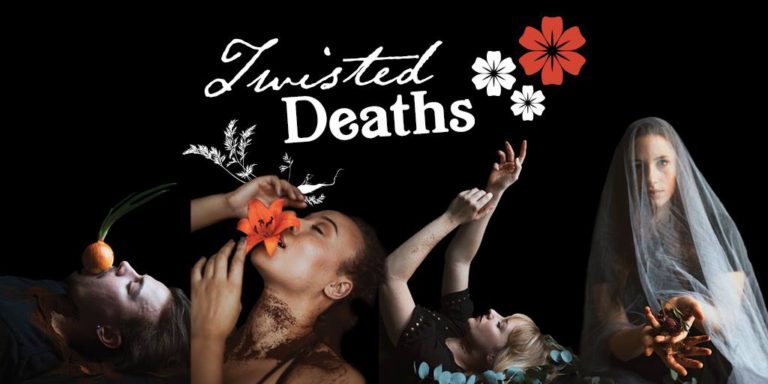

“I just want to live my life and die my death.” -Ryan Brown in Twisted Deaths
In the interest of full disclosure, I’ll start by saying that I’m a deathworker. Part of my spiritual work is helping people prepare, both emotionally and administratively, for their own and their beloveds’ deaths. Honest conversations about death, in art and in life, especially where those conversations intersect with marginalized identities, are squarely in my wheelhouse. So I was probably inclined to enjoy Uprising Theatre Company’s world premiere of Twisted Deaths, written by Uprising founder and Artistic Director Shannon TL Kearns and directed by Ashley Hovell, even if it had sucked. Spoiler alert: it definitely doesn’t suck.
Twisted Deaths has a fairly straightforward premise: Ryan (Anthony Neuman), a young trans man, and Pam (Holly Windle), an older, conservative cis woman, form an unexpected friendship after they both receive terminal cancer diagnoses. Complications arise when those diagnoses—and the decisions Ryan and Pam make in regards to them—butt up against the rest of the world. Pam, stubborn and isolated, despite her insistence otherwise, immediately begins chemo and radiation and then has to live with the consequences of undergoing such severe treatments with a flimsy support network. Ryan, weighing quality of life against quantity, considers not undergoing treatment, to the extreme consternation of his wife Melissa (Jamila Joiner) and best friend Jason (Jeff A Miller).
As you can guess even from that brief synopsis, this play delves into very charged and weighty themes. These are characters in literal life-or-death situations. Trans activism, bodily autonomy, family estrangement, Right to Die legislation, Christianity, and the profoundly broken and transphobic US healthcare system all get at least a foot in the door. Fortunately, Hovell’s deft direction, the cast’s emotionally engaging performances, and the script’s flashes of humor keep the play from feeling heavy or draggy, even when dialogue inches toward screed territory.

Performances are solid all around. All of the cast members offer us a clear sense of what their characters want and a wide range of deeply believable human reactions when they can’t get it. The play works best when characters are allowed to lay down their Big Ideas for a moment and connect to each other and/or the audience on a personal level. Standout moments for me were: hospital chaplain Heather (Kendra Alaura) and her oncologist wife Jen (Julia Alvarez) who’ve been deeply at odds throughout the play about coming out to patients and colleagues finally talking to each other, rather than across each other; Pam hitting (literal) bottom and finding herself fixated not on Life’s Big Questions but on the minutiae that usually slides past us; and Melissa finally being able to say, “You’re dying” as she falls apart in Ryan’s arms.
I wanted to shake every character at least once. This is great news, because it means that 1) the script handles complicated themes with a lot of nuance; and 2) the actors show us characters we care enough about to want them to do better by each other. No character is always right or always wrong. They all have their stances and opinions, some of which had me nodding along, some of which had me tearing my hair out, and many of which they have a heart-rendingly difficult time articulating. They screw up. They say terrible things to each other. It’s sad, infuriating, and, as I think most of us have experienced, absolutely representative of how we respond when death is knocking at a loved one’s door—or our own.
I can’t review a play where a queer character dies without addressing the fact that, well, a queer character dies. I understand and respect that some folks just cannot handle another dying LGBTQ+ character. However, Twisted Deaths (unsurprisingly, given that the playwright is trans) makes very clear that Ryan’s cancer is in no way a “punishment” for being trans, nor is it done for the shock value of creating a queer character just to kill them off. Ryan’s death, like Pam’s, is simply the price he pays for living, as do we all. The play’s disapprobation is saved for the transphobic, bottom-line-driven medical establishment that prevented Ryan from receiving competent medical care that could have saved his life.
I don’t often stay for post-show talkbacks, but because death is so central to my life I was curious to see what reactions Twisted Deaths elicited from viewers. I was thrilled to see how many audience members expressed a willingness to more actively engage themselves and their loved ones in addressing hard questions about death and dying. The post-show call to action is an integral part of Uprising’s mission, and I’m heartened to see it turned toward the one truly universal, but still woefully underdiscussed, human experience.
Twisted Deaths is a difficult play, because it’s about difficult topics, but rest assured that you will be in good hands the whole way through.
Twisted Deaths runs through Saturday, April 28, at the Phoenix Theater. Times, dates, and tickets available via the Uprising website.